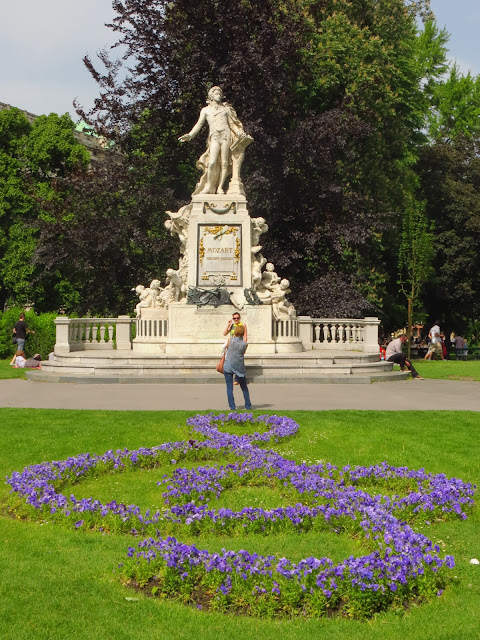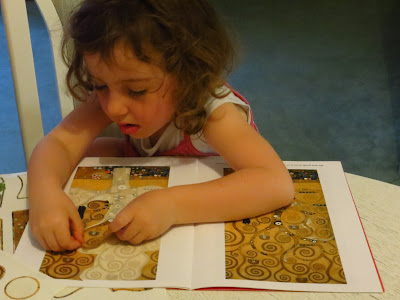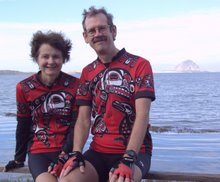We've now
started our biking in Vienna, but before we get to that -- in our next blog
entry, in fact -- we want to say something about what we saw here but more
importantly about the transition we went through while here, from fairly
stressed-out travelers on the move for 4 straight weeks to cyclists ready for
the slow lane.
Getting
to Vienna with our two suitcases, two backpacks and two large, heavy bike cases
was a challenge. The train has no
baggage car, everything goes in the train car you sit in. For a time we were in panic, we just didn't
see how this was going to work, since we were not the only folks with bags that
were too big to go in the overhead racks.
Passengers streamed in from both ends of the car, more than there were
seats for for the first 2-hour leg to Dresden.
But somehow, it did work, and we were finally able to breathe normally
and enjoy the scenery. In Vienna, a
friendly cab driver at the train station understood Jeff's high school German
even though Jeff couldn't understand a word of his rapid-fire, heavily-accented
Viennese German. We and our luggage had
made it to our friends Cordelia and Jazz in Vienna. That's one big item we could now take off the
Angst List.
Cordelia
and Jazz gave us a big welcome, and their kids Konrad and Zosia were excited to
have some new playmates. Jeff was soon
playing catch in the living room using a Nerf ball with sports-crazy 6-year-old
Konrad, each toss of the ball accompanied by commentary: "O'Malley really put some wood against
that ball . . . Jasinski is going back, back back . . . Can he get it? . . .
He's leaping . . . YES! . . . The crowd goes wild!"
Then it
was time for artsy 4-year-old Zosia to show us her Gustav Klimt coloring
book. We had been forewarned of her
interest in him, and had a Klimt sticker book ready for her that we picked up
at the Toledo Art Museum 2 weeks earlier.
She was charmed.
Jazz and
Cordelia are both on the faculty at UW Oshkosh, with the "W"
obviously being Wisconsin, not Washington.
Cordelia teaches German and Jazz International Studies, and they are in
Vienna this Spring because Jazz won a Fulbright scholarship to teach at the
Diplomatic Academy in Vienna plus do some research. The "DA" was founded over 200 years
ago by Empress Maria Theresia to train folks for the civil service of the
Austro-Hungarian Empire, while today it is a graduate school focusing on
International Relations.
 Our first
full day in Vienna was a Sunday, so Jazz could join the rest of us on a trip
into the heart of Vienna, only a kilometer from their apartment at the DA. Konrad talked his folks into paying for the
daily paper so he could read the soccer scores for the teams he has been
following since they got to Europe 3 months ago. Then, before getting into full sightseeing
mode, we stopped at a playground for the kids to be kids.
Our first
full day in Vienna was a Sunday, so Jazz could join the rest of us on a trip
into the heart of Vienna, only a kilometer from their apartment at the DA. Konrad talked his folks into paying for the
daily paper so he could read the soccer scores for the teams he has been
following since they got to Europe 3 months ago. Then, before getting into full sightseeing
mode, we stopped at a playground for the kids to be kids. Next it
was into the narrow streets of the First Bezirk, the heart of Vienna. We stopped at several churches, two where we
could take in all their baroque splendor, two where Sunday mass was being
said. We paused at the second of these,
trying to puzzle out what language the hymn was being sung in. Not German, Polish, Russian. Didn't sound Slavik, so probably not Slovak
or Serbo-Croatian. By elimination, we
finally decided it must be Hungarian.
Next it
was into the narrow streets of the First Bezirk, the heart of Vienna. We stopped at several churches, two where we
could take in all their baroque splendor, two where Sunday mass was being
said. We paused at the second of these,
trying to puzzle out what language the hymn was being sung in. Not German, Polish, Russian. Didn't sound Slavik, so probably not Slovak
or Serbo-Croatian. By elimination, we
finally decided it must be Hungarian.
 We
wandered through one century-old "indoor shopping mall" then stopped,
as all visitors to Vienna must do, at an ancient coffee house. Our choice was the Cafe Central, and it did
not disappoint either in decor or in its choices for coffee and desserts. We completed our tour with a stroll past the
Mozart statue, complete with a G-clef flower arrangement.
We
wandered through one century-old "indoor shopping mall" then stopped,
as all visitors to Vienna must do, at an ancient coffee house. Our choice was the Cafe Central, and it did
not disappoint either in decor or in its choices for coffee and desserts. We completed our tour with a stroll past the
Mozart statue, complete with a G-clef flower arrangement. On day
two it was time to tackle another stressor, reassembly of the bike. We've owned the bike 6 years but only
reasembled it twice before, most recently 4 years ago. At our age, a lot of memory disappears in one
year, let alone four, and it took five hours to accomplish the task thanks to
two complications.
On day
two it was time to tackle another stressor, reassembly of the bike. We've owned the bike 6 years but only
reasembled it twice before, most recently 4 years ago. At our age, a lot of memory disappears in one
year, let alone four, and it took five hours to accomplish the task thanks to
two complications.
The first
was the switch to larger tires so we wouldn't have to worry about unpaved bike
trails, which we know we will have from time to time here. Readjusting the front fender took only 5
minutes, but the back fender took a lot more until Jeff decided to just drill a
new hole in the fender to create more clearance. Bingo, that did the trick, at the cost of an
extra half-hour.
The other
problem was bigger. We were missing a
part. When disassembling the bike, Jeff
had mistakenly removed the front derailleur.
Bad move. It's really hard to
find the precise spot to reattach it to on the seat tube. Adding to the challenge was a missing
nut. Jeff pulled a new bolt and nut from
his spares collection, but it wasn't quite right so he cinched the derailleur
up enough to make the bike rideable and checked the Internet for a nearby bike
store. Two days later we did ride it 2km
to the shop, and Jeff made sure he knew the term for front derailleur, 'vorne
Schaltwerk.' They adjusted it
perfectly. Check off the last major item
on the Angst List.
We'll,
almost. Jeff is 97% better from a slight
cold he caught on the cruise ship that only slowed him a little, but Louise
seemed for a day or two like she might have a worse time of it. She rallied for our night at the opera --
more on that in a moment -- then felt worse for a day, then perked up by
departure day. OK, maybe don't have to
stress out about that after all.
 Monday
night we went with Cordelia to the Vienna State Opera. It's in a beautiful building on the Ring, the
grand boulevard that indeed rings the inner city. Inside was as ornate as outside. We were in the next-to-last row but not too
far off-center, and the acoustics were actually superb.
Monday
night we went with Cordelia to the Vienna State Opera. It's in a beautiful building on the Ring, the
grand boulevard that indeed rings the inner city. Inside was as ornate as outside. We were in the next-to-last row but not too
far off-center, and the acoustics were actually superb.
The
performance was far beyond 'superb.' We
have each seen Carmen five or six
times, and this was unquestionably the best yet. Both the orchestra and the singers were
absolutely top-notch, but besides that it was "grand opera" in the
grandest possible way. First, the
setting was early 19th century Spain, not a bare stage like one production we
went to at Seattle Opera. Second and
more importantly, it was peopled with huge numbers of performers who made the
scenes come alive.
Most
opera companies have choruses of 20-30 men and women who might be villagers in
one scene, nobility at a ball in another, and so on. Here there were at least 40. Other opera companies might put 5-10
additional characters onstage in non-singing roles, called
supernumeraries. Here, there were
dozens. In the first act, there were
60-90 people onstage for almost every scene.
As Act Two opened in Lilias Pastia's tavern, there were the six
principal singers, ten flamenco dancers, and 80-90 "customers," half
of them from the chorus. Then
bullfighter Don Escamillo entered with about 20 more folks! There wasn't an
empty square meter onstage! Sorry we
can't share the spectacle with you visually, but we think you can see why we
thoroughly enjoyed it, and understand why the Vienna Staatsoper is considered
one of the top companies in the world.
 Though
Louise's cold trimmed our sightseeing a little, we still did get to quite a bit
in our week in Vienna. With Cordelia and
Zosia we took the subway to Schönbrunn, the palace once
considered to be out in the country from Vienna, that the Habsburgs built to
rival Versailles.
Though
Louise's cold trimmed our sightseeing a little, we still did get to quite a bit
in our week in Vienna. With Cordelia and
Zosia we took the subway to Schönbrunn, the palace once
considered to be out in the country from Vienna, that the Habsburgs built to
rival Versailles.  Another day on our own, we went to the Belvedere, a palace turned art museum where Gustav Klimt's iconic "The Kiss" resides. Photos out the windows and in the garden were OK, but not of the art itself. As you can see in the shot to the left taken from the Belvedere, the Stefansdom, or St. Stephen's Cathedral, truly dominates the center of Vienna even today.
Another day on our own, we went to the Belvedere, a palace turned art museum where Gustav Klimt's iconic "The Kiss" resides. Photos out the windows and in the garden were OK, but not of the art itself. As you can see in the shot to the left taken from the Belvedere, the Stefansdom, or St. Stephen's Cathedral, truly dominates the center of Vienna even today. We also
admired the museum's painting of Austria's most famous empress, Maria Theresia,
flanked here by her husband and by a few of her 16 kids. Her youngest, Maria Antonia, was not yet born
when this was painted. You might
recognize that child more readily by the name the French gave her when she
married Louis XVI: Marie Antoinette.
We also
admired the museum's painting of Austria's most famous empress, Maria Theresia,
flanked here by her husband and by a few of her 16 kids. Her youngest, Maria Antonia, was not yet born
when this was painted. You might
recognize that child more readily by the name the French gave her when she
married Louis XVI: Marie Antoinette.
With all
those views of the Stefansdom, we had to explore it in person. Colored glass in the windows give it an odd
look inside. Not sure what the story is
behind those figures carved into the pulpit.
 We paid a
few euros for a tour of the catacombs below the cathedral and adjoining
square. Until 1783, most everyone buried
in Vienna was buried here, 11,000 in all.
When they ran out of room for coffins, prisoners were sent down to clean
and stack the bones from old coffins -- tibias here, femurs there. We saw it all, but out of respect for the
deceased, no photos. We next climbed the
tower, for a few more euros, and did get photos of some gargoyles as we
ascended, and of the city below when we reached the top, 343 steps above the
city.
We paid a
few euros for a tour of the catacombs below the cathedral and adjoining
square. Until 1783, most everyone buried
in Vienna was buried here, 11,000 in all.
When they ran out of room for coffins, prisoners were sent down to clean
and stack the bones from old coffins -- tibias here, femurs there. We saw it all, but out of respect for the
deceased, no photos. We next climbed the
tower, for a few more euros, and did get photos of some gargoyles as we
ascended, and of the city below when we reached the top, 343 steps above the
city.




























No comments:
Post a Comment